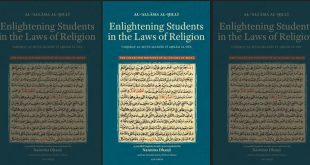The sources of ijtihad according to Shi’ah and the Ahl al‑Sunnah, put together, are: the Book, the Sunnah, ijma’ (consensus), ‘aql (reason), qiyas (analogy), istihsan, masalih mursalah, istislah, sadd al‑dhara’i’, fath al‑dhara’i; madhhab al‑sahabi, shari’at al‑salaf, ‘urf, istidlal, and so on.
In this series of articles we shall try to discuss and study these topics in detail from the Shi’i and the Sunni points of view.
We expect writers and scholars who have specialty in this field to contribute to the soundness and validity of these studies through constructive criticism relevant to the subject studied here. Any constructive criticism is very useful for correcting errors and removing shortcomings, and effective in eliminating ambiguities and omissions.
Besides rendering vital service to scholarship, it is beneficial to the author, who is forced to be more careful in his statements and precise in his research. The intellectual history of Islam is indicative of the debt that the development and expansion of legal and other scientific studies owe to diverse viewpoints and competent criticism.
This commendable and beneficial tradition has been in vogue in its most desirable form throughout the seven epochs of ijtihad among all the scholars and mujtahidun, and especially in the sixth and the seventh periods, whose fore‑runners were Wahid Behbahani and the great al Shaykh al-’Ansari respectively, this tradition reached its zenith.
Also, the very force of ijtihad, from the era of tashri’ (legislation) to the present (as discussed in detail in the article on the epochs of ijtihad), as a legitimate activity is derived from criticism and debate.
Because, in Islamic fiqh, ijtihad has had the meaning of a free and independent effort of the mujtahidun, undertaken for the purpose of advancement and expansion of the Islamic sciences. This development was not possible except through freedom of scholarly research, free expression of different views and clash between views of the mujtahidun, scholars and thinkers.
Bibliographic Information
Title: Its Meaning, Sources, Beginnings and the Practice of Ra’y
Author: Muhammad Ibrahim Jannaati
Published in: al Tawhid Islamic Journal, Vol. 5 No. 2 &3, Vol. 6, No. 1, Vol. 7, No. 3
Language: English
Length: 92 pages
 Ijtihad Network Being Wise and Faithful Muslim in the Contemporary World
Ijtihad Network Being Wise and Faithful Muslim in the Contemporary World

